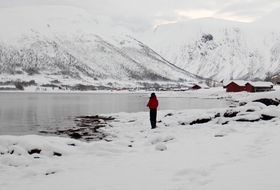
Sikkim is a hilly State in north-east India. Surrounded by villages that attracts outsiders thanks to its soothing calmness and natural beauty.
Thanks to shifting winds and ocean currents, maybe caused by climated change, Galapagos penguins rebound.
Penguins, among birds, are the funniest ones, maybe for their odd walk or their inability to fly. Among the 17 existing species, the only one living near the Equator is considered to be the world’s rarest penguin species, the Galapagos penguin (Spheniscus mendiculus).
These small birds (less than 50 centimetres tall), endemic to the archipelago of the Galapagos, in 2000 have been listed as endangered species. The number of penguins dropped to only few hundred of individuals, mainly due to Niño, phenomenon that increases ocean temperature creating climate imbalances, which reduced the population by 77% in the 1980s.
New study, published by the magazine Geophysical Research Letters, shows positive data related to the future of the species: over the past 30 years, the population of the Galapagos penguins has doubled. According to researchers of the Woods Hole Oceanographic Institution of Massachusetts, the trend reversal is due to shifting winds and ocean currents, which increased cold currents flowing from the Antarctic to the Galapagos Islands, creating the ideal habitat for penguins.
The “pool of cold water” that has been created is rich in nutrients, and favoured the development of algae and fish, allowing penguins to rebound, reaching over 1,000 individuals.
Shifts in winds and ocean currents could be caused both by natural variability and climate change. This could have moved cold water northward, along the coasts of the Isabela and Fernandina islands, bringing fish populations followed by animals feeding and breeding in cold waters.
The phenomenon could be ephemeral though. Ocean conditions could vary, causing a drop in penguin populations.
“The penguins are the innocent bystanders experiencing feast or famine depending on what the Equatorial Undercurrent is doing from year to year,” said Kristopher Karnauskas, one of the study’s lead authors.
Latest findings provide new elements to improve penguin conservation, for example increasing the efforts in the northern coasts of the islands, and extending protected marine areas northward. Karnauskas believes that most of marine organisms will be negatively influenced by ocean increasing temperatures and water acidification.
“With climate change, there are a lot of new and increasing stresses on ecosystems, but biology sometimes surprises us,” said Karnauskas. “There might be places where ecosystems might thrive just by coincidence”.
Siamo anche su WhatsApp. Segui il canale ufficiale LifeGate per restare aggiornata, aggiornato sulle ultime notizie e sulle nostre attività.
![]()
Quest'opera è distribuita con Licenza Creative Commons Attribuzione - Non commerciale - Non opere derivate 4.0 Internazionale.
Sikkim is a hilly State in north-east India. Surrounded by villages that attracts outsiders thanks to its soothing calmness and natural beauty.
Sikkim, one of the smallest states in India has made it mandatory for new mothers to plant saplings and protect them like their children to save environment
Chilekwa Mumba is a Zambian is an environmental activist and community organizer. He is known for having organized a successful lawsuit against UK-based mining companies.
What led to the Fukushima water release, and what are the impacts of one of the most controversial decisions of the post-nuclear disaster clean-up effort?
Nzambi Matee is a Kenyan engineer who produces sustainable low-cost construction materials made of recycled plastic waste with the aim of addressing plastic pollution and affordable housing.
The Arctic-midlatitude teleconnection will become a less reliable predictor of midlatitude winter anomalies in a warmer future.
The Arctic sea ice’s near future might look different than we thought. A new study focused on the near future of the ice in the Arctic region.
Nearly 100 people have died in the heatwave in India that has badly hit millions of people who work under the blazing sun to earn their livelihood.
Mizoram, one of India’s least populous states, has been losing its forest cover due to the age-old slash-and-burn farming method known as Jhum cultivation.







